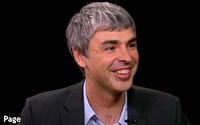 The
ad-based model that Google has pioneered allows the Internet to grow and mature, but when an investor during the company's shareholder meeting in Mountain View, Calif., Wednesday asked how ad-blocking
technology will influence the company's main revenue stream, Google co-founder Larry Page explained. He said the company has been dealing with ad blocking for a long time. "Many places where ads get
blocked, search ads do not because they're useful," he said.
The
ad-based model that Google has pioneered allows the Internet to grow and mature, but when an investor during the company's shareholder meeting in Mountain View, Calif., Wednesday asked how ad-blocking
technology will influence the company's main revenue stream, Google co-founder Larry Page explained. He said the company has been dealing with ad blocking for a long time. "Many places where ads get
blocked, search ads do not because they're useful," he said.
There are several products on the market that block advertisements. Page said to circumvent the road block, "the industry needs to
produce ads that are much less annoying and quicker to load."
Page thinks the industry has become a lot better at providing relevant advertisements that answer questions, not just providing
information. "We've been trying to pioneer that," he said. "Search ads do that well."
advertisement
advertisement
Google even launched an ad-blocking subscription service that reduces the number
of advertisements seen on publisher sites, where the company shares the revenue with publishers. Contributor arrived in beta April 2015. The subscriber chooses a monthly contribution and sets up a
payment through Google Wallet. It only works when Web browser in their Google account. Mashable, the Onion, Imgur, ScienceDaily, wikiHow and Urban Dictionary signed on to participate.
Services
on mobile from Adblock Plus and TrustGo also exist, allowing users to control the amount of advertising they see in apps and the mobile Web, according to reports. Shine, an Israeli-based company, claims to have backing from the major wireless
carriers, which could certainly put a damper on the industry. The most recent stats from PageFair, an anti ad-blocking company,
and Adobe count 144 million active ad blocker users worldwide, up from 70% between 2013 and 2014.